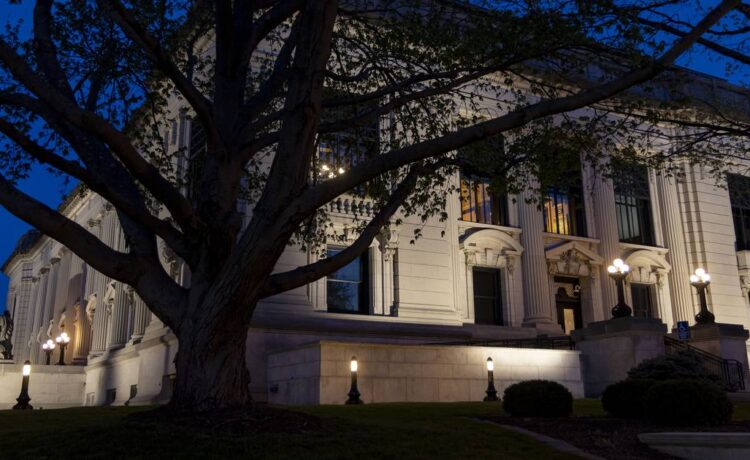The Illinois Supreme Court on Friday upheld a landmark law that consolidated hundreds of suburban and downstate police and firefighter pension funds.
In a unanimous decision, the state’s high court sided with two lower courts in rejecting the argument that participants’ diluted role in electing representatives to make investment decisions under the new law violates the state constitution’s pension protection clause.
“The ability to vote in elections for local pension board members is not … a constitutionally protected benefit, nor is the ability to have local board members control and invest pension funds,” Chief Justice Mary Jane Theis wrote in an 11-page opinion joined by the court’s six other justices.
Gov. J.B. Pritzker signed the measure in 2019, promising it would bring greater financial stability to the roughly 650 local funds serving communities outside Chicago and property tax relief to local residents. The law took effect in 2020 but gave the local funds time to transfer their assets.
A group of 18 pension funds and about three dozen active police and firefighters and retirees challenged the law in a 2021 lawsuit, arguing that the move violates the state constitution’s guarantee that public employee pension benefits “shall not be diminished or impaired.”
A circuit court previously dismissed the pensions funds themselves from the case, finding they lacked standing.
Prior to the consolidation, each local pension board was composed of five members: two appointed by the mayor or village president, two elected by active police or firefighters, and one elected by retirees.
While the local boards still exist with the same composition, they’ve lost authority over investment decisions, which are now made by managers for the two statewide funds.
Each of those funds is overseen by a nine-member board. The police board is made up of three members elected by active officers, two elected by retirees, three chosen by local municipalities, and one representative of the Illinois Municipal League appointed by the governor. The fire board is similarly composed, except retirees elect only one representative, with the remaining seat going to a person recommended by the Associated Fire Fighters of Illinois union and appointed by the governor.
In a court filing, attorneys for plaintiffs challenging the law wrote, “As a result, the Act substantially impacted and diluted each police officer’s and firefighter’s voting rights and ability to determine who their personal retirement assets are invested.”
They also argued that the requirement to transfer assets to the combined funds violates state constitutional protections for property rights.
In its argument to the high court, the state called the argument that the constitution’s pension protections extend to ancillary issues such as voting rights “unsound.”
Illinois Supreme Court precedent has established the constitutional pension protections, while “ironclad,” extend only to payments promised to participants in the retirement systems, not to changes to state law that affect their funding level, the state argued in its filing to the Supreme Court.
In their ruling, the justices sided with the state, finding that the state constitution protects only the financial benefits that retirees ultimately receive from the pension funds.
“Simply put, the 2020 amendment to the Pension Code has no impact on plaintiffs receiving their promised monetary benefits,” the court found.
The court has cited the pension protection clause in striking down previous legislative attempts to shore up underfunded public pensions. But during arguments in November, several justices appeared skeptical of the contention that those protections extended to issues such as the weight of a person’s vote in electing members to a board that oversees investments.
In questioning, Theis noted that previous rulings found protections covered issues such as health care, disability, life insurance and survivor annuity but not issues involving the funding of the retirement systems themselves.
The court also rejected claims that having the local funds cover startup costs for the two consolidated funds would affect benefits, and that the transfer of assets to the centralized funds was a violation of property rights.
Whether the consolidation actually will result in lower property tax bills, one of the law’s main selling points, remains in question. Pritzker on Friday again brought up the potential for such a benefit in calling the high court’s ruling “a victory for Illinois taxpayers, local governments and first responders.”
“After 70 years of attempts, my partners in the General Assembly and I were able to accomplish meaningful reform during my first term in office,” Pritzker said in a statement. “We ushered in a new era of responsible fiscal management, one aspect of which has been consolidating over 600 local pension systems to increase returns and lower fees, reducing the burden on taxpayers and keeping another campaign promise.”
The Illinois Municipal League, which represents local governments across the state, also praised the decision.
“Personally, having worked on this issue for more than a decade and as a drafter of the legislation, I am gratified by the consistent rulings in favor of the Act and in the determination that will now allow everyone to focus on strengthening and growing the funds,” CEO Brad Cole wrote in an email to the group’s board.
Cole sits on the boards of both the police and fire pension investment funds.
The pension fund participants who challenged the law expressed disappointment with the court’s decision.
“I thought that the issue of whether or not the ability to vote in a substantial and meaningful way for each of the smaller municipalities across the state meant something, and I think it is a benefit,” attorney Daniel Konicek said in an interview. “The court obviously disagreed.”
A variety of factors contributed to low funding levels for the police and fire pension funds over the years, from inaccurate actuarial assumptions and poor market performance to inadequate contributions from municipal governments and benefit enhancements approved by the General Assembly.
The year Pritzker signed the consolidation, unfunded liabilities across roughly funds totaled more than $13 billion, according to a recent report from the legislature’s bipartisan Commission on Government Forecasting and Accountability.
At the time, the $15.8 billion in total assets held by those funds was only enough to cover about 55% of liabilities, according to the report, down from a peak of 77% funding in 1999 and well short of the funding target of 90% by 2040 set in state law.
Even before the consolidation took full effect last year, when assets were transferred to the statewide funds, those numbers had improved, with unfunded liabilities dropping to just under $11 billion and the funding level reaching 65% in the state’s 2021 budget year.














